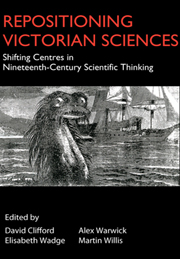Book contents
- Frontmatter
- Contents
- Notes on Contributors
- 1 Margins and Centres
- SECTION I Shifted Centres
- SECTION II Contested Knowledges
- 7 ‘Supposed Differences’: Lydia Becker and Victorian Women's Participation in the BAAS
- 8 A Fair Trial for Spiritualism?: Fighting Dirty in the Pall Mall Gazette
- 9 ‘This is Ours and For Us’: The Mechanic's Magazine and Low Scientific Culture in Regency London
- 10 How did the Conservation of Energy Become ‘The Highest Law in All Science’?
- 11 ‘Scriptural Geology’, Vestiges of the Natural History of Creation and Contested Authority in Nineteenth-Century British Science
- 12 ‘This House is a Temple of Research’: Country-House Centres for Late Victorian Science
- SECTION III Entering The Modern
- Notes
- Select Bibliography
8 - A Fair Trial for Spiritualism?: Fighting Dirty in the Pall Mall Gazette
from SECTION II - Contested Knowledges
Published online by Cambridge University Press: 05 March 2012
- Frontmatter
- Contents
- Notes on Contributors
- 1 Margins and Centres
- SECTION I Shifted Centres
- SECTION II Contested Knowledges
- 7 ‘Supposed Differences’: Lydia Becker and Victorian Women's Participation in the BAAS
- 8 A Fair Trial for Spiritualism?: Fighting Dirty in the Pall Mall Gazette
- 9 ‘This is Ours and For Us’: The Mechanic's Magazine and Low Scientific Culture in Regency London
- 10 How did the Conservation of Energy Become ‘The Highest Law in All Science’?
- 11 ‘Scriptural Geology’, Vestiges of the Natural History of Creation and Contested Authority in Nineteenth-Century British Science
- 12 ‘This House is a Temple of Research’: Country-House Centres for Late Victorian Science
- SECTION III Entering The Modern
- Notes
- Select Bibliography
Summary
The type of faith or Spiritual reliance,
Used to be ‘Daniel in the den of Lions.’
But since a certain case in Chancerie,
‘Lyons in Daniel's den,’ it ought to be.
In early May 1868, the correspondence pages of the Pall Mall Gazette (PMG) were the scene of a heated debate between two of the most well known figures of the day, Professor John Tyndall and Mr Daniel Dunglas Home. Each man was the recognized leader of his field, but their fields were apparently diametrically opposed. Tyndall was head of the Royal Institution and the natural heir to the late Michael Faraday as experimental philosopher and materialist scientist; Home was celebrated across Europe and America as a gifted spiritualist medium, whose physical phenomena were unsurpassed. Their topic was a séance proposed in 1861, at which Faraday was to have examined spiritualist phenomena produced by Home, but which had not ultimately taken place. The two men began a stiffly polite dialogue within the correspondence columns, but rapidly degenerated into personal attacks and self-vindicating reasoning. By the time they called a truce in late May, the debate had clearly demonstrated the strength of the barriers constructed between established scientific practice and areas of investigation still regarded as beyond the scientific pale.
- Type
- Chapter
- Information
- Repositioning Victorian SciencesShifting Centres in Nineteenth-Century Thinking, pp. 95 - 106Publisher: Anthem PressPrint publication year: 2006
- 1
- Cited by



